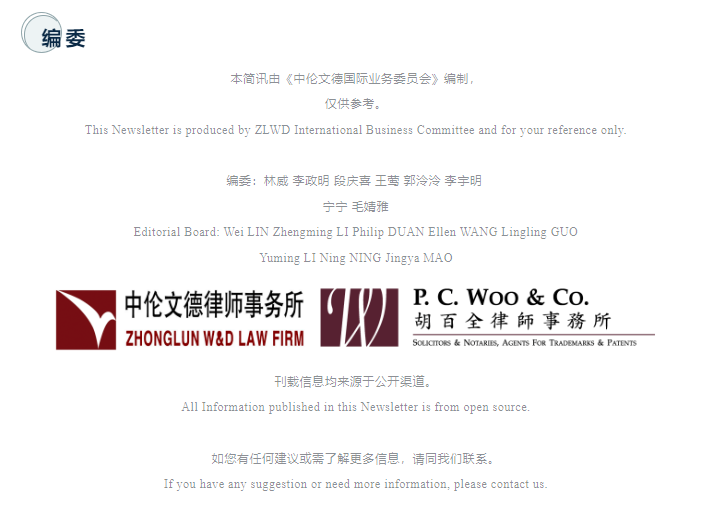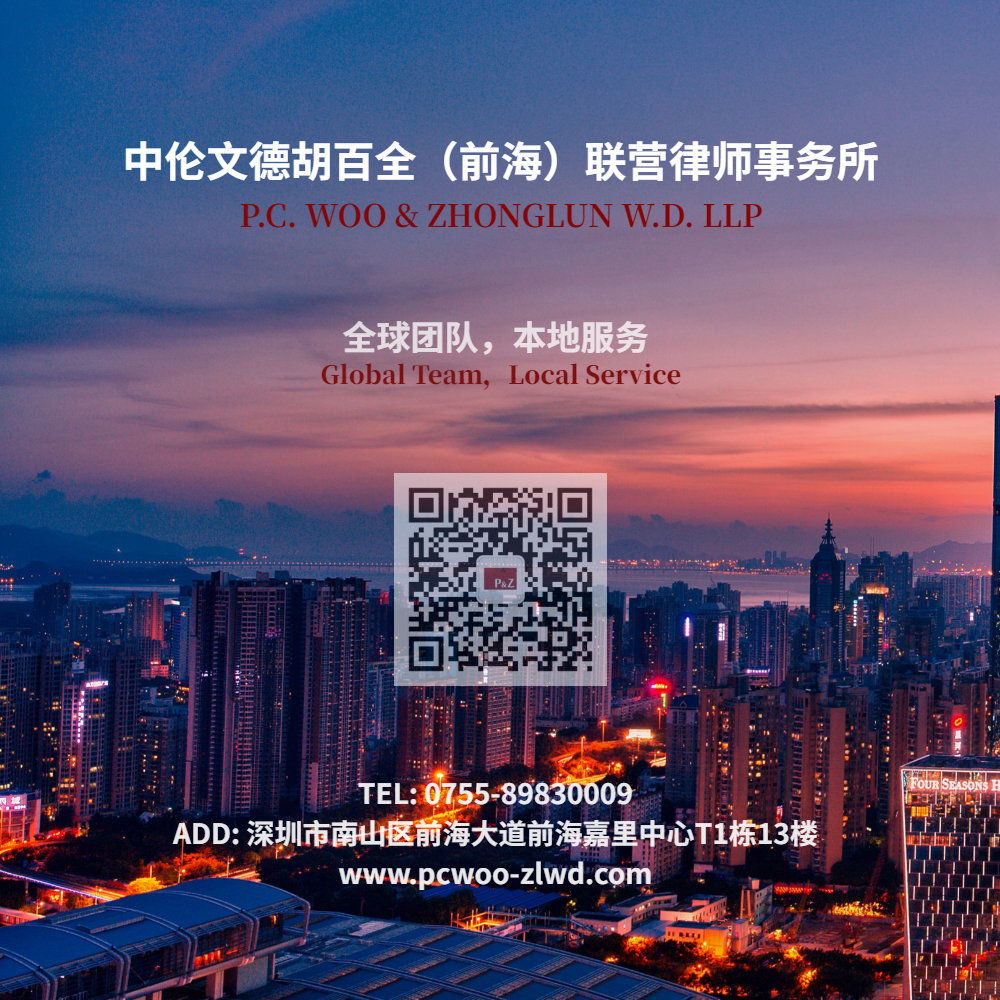
NEWS

NEWS
以下文章来源于中伦文德律师事务所 ,作者ZLWD

The Maritime Silk RoadArbitration Center of China Maritime Arbitration Commission Inaugurated in Xiamen
With the approval of the China Council for the Promotion of International Trade and the Fujian Provincial People's Government, and with the registration of the Fujian Provincial Department of Justice, the China Maritime Arbitration Commission has established the Maritime Silk Road Arbitration Center of China Maritime Arbitration Commission (hereinafter referred to as "CMAC Maritime Silk Road Arbitration Center") in Xiamen, Fujian Province. On 30 March 2023, during the opening of the 7th International Mediation Summit, the CMAC Maritime Silk Road Arbitration Center is officially inaugurated.
The CMAC Maritime Silk Road Arbitration Center will give full play toits advantages in professional legal services of China Maritime Arbitration Commission, based in Xiamen, connect the two sides of the Taiwan Straits, serve the whole country, radiate Southeast Asia, link Asia, Africa and Latin America, focus on promoting mechanism innovation, strengthen talent support, actively promote Xiamen as the "preferred international dispute resolution place", help to build a soft environment for regional foreign-related legal services, and will escort the construction of "the Belt and Road Initiative".
The Supreme Courts of China and Singapore Signed an MOU on Cooperation on the Management of International Commercial Disputes in the Context of Belt and Road Initiative through a Litigation-Mediation-Litigation Framework
On 1 April 2023, The Supreme Court of Singapore and China jointly signed Memorandum of Understanding on Cooperation on the Management of International Commercial Disputes in the Context of the Belt and Road Initiative (BRI) through a Litigation-Mediation-Litigation (LML) Framework (hereinafter referred to as the "MOU").
The MOU aims to promote friendship between China and Singapore, facilitate the high-quality development of BRL, and provide flexible, innovative and efficient dispute resolution for the parties, strengthen cooperation between Supreme Courts of China and Singapore in the management of international commercial disputes in the context of BRL.
The MOU stipulates six aspects including the formulation and implementation of LML framework, cooperation with other parties, information sharing, features of LML framework, model provisions of LML and other matters, which shall come into effect from the date of signing.
The First Global Ranking of the Credibility of International Arbitration Institutions along the Belt and Road Released
As more countries and international organizations join the Belt and Road Initiative, more and more commercial entities choose arbitration to resolve disputes. In order to provide scientific reference for commercial entities to choose arbitration institutions, on 13 April 2023, Durham International Dispute Resolution Institute formulated and jointly eleased a Credibility Assessment Report and Ranking of the Crediility of International Arbitration Institutions along the Belt and Road (hereinafter referred to as the "Assessment Report and Ranking") with the Research Center for the Rule of Law, Economy and the Law-based Society of the South China University of Technology.
A total of 38 arbitration institutions participated in the evaluation, of which 21 are in Asia and 8 in Europe. According to the Assessment Report and the Ranking, the average score of all arbitration institutions was 6.68, with the highest score being 8.99 and the lowest 5.49. The Hong Kong International Arbitration Center (HKIAC) and the Singapore International Arbitration Center (SIAC), as traditional international arbitration centers, ranked in the top two positions, while the Guangzhou Arbitration Commission (GAC), the Vienna International Arbitration Center (VIAC) and the Dubai International Arbitration Center (DIAC) ranked third to fifth.
The Assessment Report and the Ranking are conducted by internationally renowned arbitration experts, lawyers and judges to consider the credibility of international arbitration institutions from multiple perspectives and positions, so as to make an objective and fair assessment. The release of the Assessment Report and the Ranking of Credibility will help to raise the awareness of cooperation and professionalism among regional arbitration institutions, to build a multi-level and diversified dispute resolution mechanism, to learn from each other and improve the alignment and harmonisation of the rules of inter-regional arbitration institutions, and to provide a good business environment for inter-regional economic and trade cooperation and dispute resolution proposals.
Shanghai First Intermediate People's Court:
Where an Arbitration Agreement is Entered into with a Branch Office, if the Head Office Actively Defends itself as the Respondent in the Arbitration, it Cannot Later Request the Revocation of the Arbitration Award on the Grounds that it is not the Subject of the Arbitration
Legal Basis:
Arbitration Law
Article 20
Where the parties concerned have a differing opinion upon the validity of an arbitration agreement, a request may be made for an award to be made by the arbitration commission or a judgment made by the People's Court. Where one party requests an award to be made by the arbitration commission and the other party requests a judgment from the People's Court, it shall be judged by the People's Court.
Where the parties concerned have a differing opinion upon the validity of an arbitration agreement, this shall be raised before the arbitration tribunal commences the first hearing.
Interpretation of the Supreme People's Court on Certain Issues relating to Application of the Arbitration Law of the People's Republic of China
Article 13
Pursuant to the second paragraph of Article 20 of the Arbitration Law, where a party has not objected to the validity of an arbitration agreement before the opening session of hearings conducted by the arbitration tribunal, but the party subsequently applies to the people's court to determine the invalidity of the arbitration agreement, the people's court shall not hear such a case.
Where an arbitration agency has decided on the validity of an arbitration agreement and a party subsequently applies to the people's court to determine the validity the arbitration agreement or overturn the decision of the arbitration agency, the people's court shall not hear such a case.
Case Description:
On 29 January 2018, Shanghai Hejing Landscape Planning and Design Co., Ltd. (hereinafter referred to as "Hejing Company") entered into a Construction Engineering Design Contract with Linyi Branch of Miaofu Ecological Construction Co., Ltd.(hereinafter referred to as "Linyi Branch of Miaofu Company"). Due to the disputes arising from the performance of this contract, Heijing Company applies for arbitration to Shanghai Arbitration Commission (hereinafter referred to as the "Arbitral Tribunal") on December 13, 2018, requesting: 1. Linyi Branch of Miaofu Company shall pay the design fee to Heijing Company; 2. Miaofu Ecological Construction Co., Ltd.(hereinafter referred to as the "Miaofu Company") shall be jointly liable for the above debts of Linyi Branch of Miaofu Company. Linyi Branch of Miaofu Company argued that the Hejing Company had not completed the design fee in the contract, while Miaofu Company argued that it agreed with Linyi Branch of Miaofu Company's defence.
The Arbitral Tribunal made a finding on the issue of the validity of the contract and the subject matter of the arbitration of Linyi Branch of Miaofu Company. Although Linyi Branch of Miaofu Company did not have an independent legal personality, it signed the contract in its own name, paid the money and received the invoice, indicating that it had formed an organisational body after registration and actually had disposable property, which met the conditions to be a party to the arbitration. In the arbitration, Linyi Branch of Miaofu Company and Miaofu Company did not object to the branch's participation in the arbitration activities, so the Arbitral Tribunal confirmed the subject status of Linyi Branch of Miaofu Company in the arbitration case.
On 25 February 2021, the Arbitral Tribunal rendered (2019) Huzhong Case No. 0204 Award (hereinafter referred to as the "Arbitral Award"): 1. Linyi Branch of Miaofu Company shall pay the wages, travel expenses and design fees of the designers of Heijing Company; 2. Miaofu Company shall undertake supplementary payment obligations in respect of the failure of Linyi Branch of Miaofu Company to fulfil the debts determined in the main text of the first clause of the Arbitral Award.
On 17 June 2021, Miaofu Company, as the Claimant, listed Heijing Company as the Respondent and filed an application with the Shanghai First Intermediate People's Court (hereinafter referred to as the "Court") to set aside the Arbitral Award. The reason was that there was no arbitration agreement between Miaofu Company and Hejing Company. The parties to the contract in question were Linyi Branch of Miaofu Company and Hejing Company, and Miaofu Company was not a party to the contract. As a branch office legally established and licensed to operate, Linyi Branch of Miaofu Company was entitled to operate and sign contracts within the scope of its business and the authority of the head office, and was eligible for litigation and arbitration. Only if Linyi Branch of Miaofu Company was unable to fulfil its obligations under the arbitration award, Miaofu Company can be listed as the executor to the enforcement case through the statutory procedure of adding or changing the executor to bear the supplementary liability. The Respondent, Hejing Company, argued that it disagreed with Miaofu Company's application for dismissal of the case, and that Miaofu Company had not only attended the arbitration hearing, but had also filed a counter-claim for arbitration. Therefore, Miaofu Company had actually accepted the arbitration jurisdiction.
Court’s View:
With regard to Miaofu Company's claim that there was no arbitration agreement between Miaofu Company and Hejing Company, the Court held that, according to the provisions of Article 20(2) of the Arbitration Law of the People's Republic of China and Article 13 of Interpretation of the Supreme People's Court on Certain Issues relating to Application of the Arbitration Law of the People's Republic of China, Linyi Branch of Miaofu Company has entered into an arbitration agreement with Hejing Company, after participating in the arbitration hearing, Miaofu Company did not dispute that there was no arbitration agreement between it and Hejing Company. On the contrary, Miaofu Company had filed a counter-claim with the Arbitral Tribunal, in essence accepting the Arbitral Tribunal's jurisdiction over the case. As Miaofu Company did not raise any objection to the validity of the arbitration agreement in the arbitration, the Court did not support Miaofu Company's request to set aside the Arbitral Award on the ground that there was no arbitration agreement between Miaofu Company and Hejing Company.
In conclusion, in accordance with Article 58(1) and Article 60 of the Arbitration Law of the People's Republic of China and Article 17 of Interpretation of the Supreme People's Court on Certain Issues relating to Application of the Arbitration Law of the People's Republic of China, the Court ruled that the application of the Claimant Miaofu Ecological Construction Co., Ltd. is rejected.
International Center for Settlement of Investment Disputes:
The Most Favoured Nation Clause Shall not Extend the Scope of Application of the Dispute Settlement Clause
Case Description:
The mines of the Singapore AsiaPhos Limited (hereinafter referred to as the "AsiaPhos Limited") are located in the newly constructed Giant Panda National Park (hereinafter referred to as the “Panda Park”) in Sichuan Province. In June 2017, the AsiaPhos Limited received a notice from the environmental protection department of Mianzhu , Sichuan Province, requiring it to terminate the operation of the two phosphate mines and to obtain approval for a soil and water conservation plan. In November 2017, the Mianzhu Municipal Government of Sichuan Province (hereinafter referred to as the "Mianzhu Municipal Government") issued a notice to the AsiaPhos Limited requiring it to vacate and restore the mines on the grounds that they were located in the Jiudingshan Nature Reserve in Sichuan Province. In February 2018, the Group's mining rights expired. The Sichuan provincial government rejected the group's application for renewal of its mining rights and ordered it to cease mining activities at the two phosphate mines. The Sichuan authorities rejected the AsiaPhos Limited's application for renewal of the mining rights based on "public interest considerations" as the mines are located within the Panda Park area.
AsiaPhos Limited considered that the actions of the Mianzhu Municipal Government constituted an " Unlawful Expropriation" and that the dispute could not be resolved amicably after negotiations, and therefore, pursuant to Article 13(3) of the Agreement between the Government of the People’s Republic of China and the Government of the Republic of Singapore on the Promotion and Protection of Investments (hereinafter referred to as the "PRC-Singapore BIT") and the Arbitration Rules of the United Nations Commission on International Trade Law (UNCITRAL), filed a lawsuit with the International Center for Settlement of Investment Disputes (hereinafter referred to as the "Arbitral Tribunal") in 2020 to initiate international investment arbitration against Mianzhu Municipal Government.
The Respondent, Mianzhu Municipal Government, objected to the jurisdiction of the Arbitral Tribunal, arguing that the jurisdiction of the Arbitral Tribunal was limited to disputes over quantitative issues relating to the amount of compensation for expropriation and that the Arbitral Tribunal did not have jurisdiction over the issue raised by the Claimant regarding the existence and legality of the expropriation.
Court’s View:
In this case, the main dispute centerd on the jurisdictional aspect. The Arbitral Tribunal dealt with the following two issues in turn: firstly, whether the scope of the respondent's consent to arbitration contained in Article 13(3) 【3】of the PRC-Singapore BIT covered the claimant's claim for expropriation; and secondly, whether the Most Favoured Nation Clause (hereinafter referred to as the "MFN Clause") contained in Article 4【4】 of the PRC-Singapore BIT could be used to extend the scope of the respondent's consent to arbitration.
1. Whether the scope of the Respondent's consent to arbitration covers the Claimant's claim for expropriation?
The key to the jurisdictional decision in this case is the interpretation of Article 13(3) of the PRC-Singapore BIT. The Arbitral Tribunal, in accordance with the rules contained in Articles 31 and 32 of the Vienna Convention on the Law of Treaties, having considered the ordinary meaning, the context, the history of the contracting parties and the principles of interpretation of validity of the text of Article 13(3) of the PRC-Singapore BIT, finds that the term "involving" is neutral and non-conclusive; the expression “the amount of compensation” is more informative to determine the scope of the arbitration clause; the history of contracting supports a narrow interpretation.
The majority opinion ultimately adopts a narrow interpretation of the scope of disputes that may be submitted to international arbitration under the clause - the clause only allows disputes relating to the amount of compensation for expropriation (the amount issue) to be submitted to international arbitration; the tribunal has no jurisdiction over disputes as to the existence and legality of the expropriation (the right issue).
2. Whether the MFN Clause can be used to extend the scope of consent to arbitration?
The majority opinion of the Arbitral Tribunal further rejected the Claimant's argument that the MFN clause could be used to extend the scope of application of the dispute settlement clause.
As noted at the outset of the Arbitral Tribunal’s reasoning, an arbitral tribunal has jurisdiction only if, and to the extent that, the Parties have consented thereto in a clear and unequivocal manner. This fundamental approach must also be considered when assessing whether the arbitral consent of one party can be expanded by virtue of an MFN clause.
In the case at hand, the Arbitral Tribunal found that the PRC-Singapore BIT does not provide for such expansion of the arbitration clause by virtue of the MFN clause. First, pursuant to its ordinary meaning, the wording of Article 4 cannot be considered an unambiguous expansion of the arbitration clause. Secondly, considered in context, the Contracting Parties to the Treaty have negotiated and agreed on an arbitration clause with a carefully negotiated and limited scope, encompassing only disputes over the amount of compensation. Therefore, they cannot be presumed to have agreed that the diligently negotiated scope of the arbitration clause could be enlarged without any additional agreement but rather based on subsequently negotiated arbitration clauses from unrelated treaties negotiated in an unrelated context. The tribunal reinforced these conclusions by citing an exchange of letters between China and Singapore in which the parties undertook to negotiate to expand the areas of dispute that could be submitted to arbitration.
Therefore, the Arbitral Tribunal concludes that the scope of the arbitration clause in Article 13(3) cannot be expanded by virtue of the MFN clause in Article 4 of the PRC--Singapore BIT.
In summary, the International Center for Settlement of Investment Disputes rejects all claims made by the Claimant.
【3】Article 13 of the PRC-Singapore BIT Investment Disputes:
1. Any dispute between a national or company of one Contracting Party and the other Contracting Party in connection with an
investment in the territory of the other Contracting Party shall, as far as possible, be settled amicably through negotiations between
the parties to the dispute.
2. If the dispute cannot be settled through negotiations within six months, either party to the dispute shall be entitled to submit the dispute to the competent court of the Contracting Party accepting the investment.
3. If a dispute involving the amount of compensation resulting from expropriation, nationalization, or other measures having effect equivalent to nationalization or expropriation mentioned in Article 6 cannot be settled within six months after resort to negotiation as specified in paragraph (1) of this Article by the national or company concerned, it may be submitted to an international arbitral tribunal established by both parties.
The provisions of this paragraph shall not apply if the national or company concerned has resorted to the procedure specified in the
paragraph (2) of this Article.
【4】 Article 4 of the PRC-Singapore BIT Most Favoured Nation Clause:
Subject to Articles 5, 6 and 11, neither Contracting Party shall in its territory subject investments admitted in accordance with the provisions of Article 2 or returns of nationals and companies of the other Contracting Party to treatment less favourable than that which it accords to investments or returns of nationals and companies of any third State.


